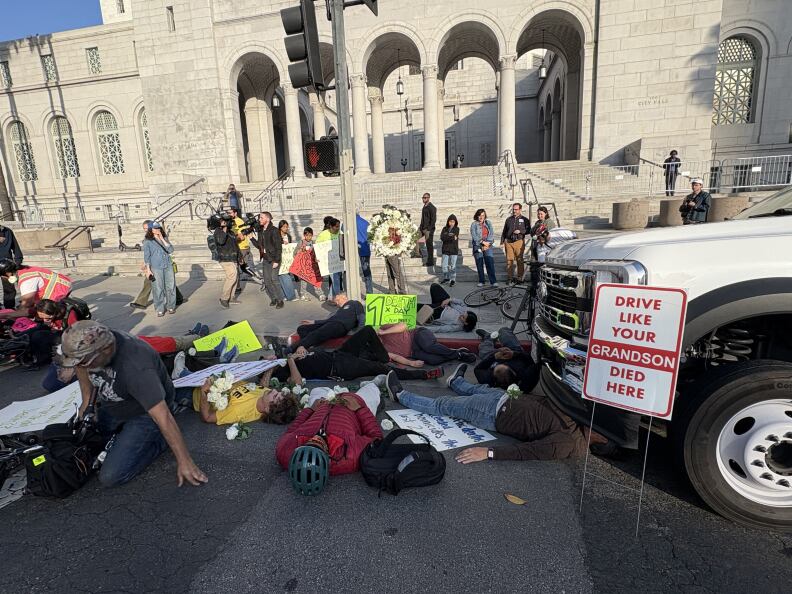Protesters on Wednesday evening laid in the street in front of Los Angeles City Hall as if they were dead.
They stayed there for about three minutes and three seconds, representing the 303 people who died in traffic collisions last year, according to estimates from the Los Angeles Police Department. They then marched to the Department of Transportation’s headquarters, chanting “L.A. Mayor’s budget will kill us” along the way.
The protest was a visceral reminder of what’s at stake as L.A. grapples with an unprecedented billion-dollar deficit that has led Mayor Karen Bass to propose a budget with deep cuts to city agencies. The Department of Transportation, which leads transportation planning and design for the city, would lose a quarter of its positions under the mayor’s proposed budget.
“Everybody has their budget concern, and they all want their piece of the pie, but this piece of pie is life or death,” “Grandma” Beverly Shelton, co-founder of SoCal Families for Safe Streets, said in an interview with LAist at the demonstration.
The next day, Laura Rubio-Cornejo, general manager for the city’s Department of Transportation, detailed the effects the proposed budget would have on the agency in a presentation to the L.A. City Council’s budget and finance committee.
Rubio-Cornejo said the department would not be able to provide many of its services if the mayor’s budget is adopted. The proposed cuts, Rubio-Cornejo said, could also jeopardize revenue generated by parking enforcement and implementation of Measure HLA and Vision Zero, two ambitious programs aimed at improving road safety and reducing traffic fatalities to zero.
“I want [your constituents] to make it to that doctor’s appointment on time, and I want them to enjoy that evening walk without fear of a crash that changes or ends their life,” Rubio-Cornejo said at the hearing. “The pressure and stakes to do so are extremely high.”

More than two dozen people protested the mayor’s proposed cuts to the Department of Transportation on Spring Street downtown Wednesday.
The mayor’s transportation budget
The budget proposed by Bass includes a total of 1,647 layoffs across city departments.
More than 270 of those layoffs would come from the Department of Transportation,
That’s the second-highest number of cuts proposed for a single department in the mayor’s budget. The LAPD is facing a 403-person cut to its civilian personnel.
Department of Transportation staff who paint the roads and maintain street signage, parking and traffic officers, as well as those who shepherd grant-funded safety projects are all vulnerable to layoffs in the proposed budget.
Parking revenue in jeopardy
The mayor is proposing a 22% reduction in the number of parking enforcement and traffic control officers, as well as a slashing of more than half of the department’s parking adjudicators. Rubio-Cornejo said those staff are critical for essential services like maintaining clear bus lanes and parking availability, as well as revenue generation.
The city and county recently teamed up on a program that uses AI to enforce parking rules at bus lanes and bus stops. The program is limited to just a handful of bus routes within the city, but it’s already generating several thousands more parking citations than the city usually doles out.
More citations mean more appeals, which are handled by parking adjudication staff at the department.
“We are already struggling to keep up with the number of appeals,” Rubio-Cornejo said. “We process approximately 8,500 appeals a month.”
Without adequate staff, Rubio-Cornejo said, the department would have to issue automatic citation dismissals to honor state-mandated deadlines for reviewing citation appeals. That would reduce the overall revenue the department generates for the general fund, she said.
Vision Zero, HLA and road quality
With the Vision Zero program, L.A. set an ambitious goal of reducing traffic deaths to zero by 2025.
An independent auditor recently found that a combination of lack of political will and poor coordination hampered the city’s ability to reach this goal.
Acting on the auditors’ findings and reducing traffic deaths will be made more difficult, Rubio-Cornejo said, if these proposed cuts are implemented. Rubio-Cornejo said cuts to the engineering teams that coordinate infrastructure projects and the external affairs team, which handles community engagement and education, would slow the revival of Vision Zero’s goal.
The same cuts could also get in the way of Measure HLA projects that aim to optimize L.A.’s roads for pedestrians, cyclists and transit, Rubio-Cornejo said.
“The reduction in staffing levels would impede on our ability to deliver on those projects,” Rubio-Cornejo said, adding that 19 of those projects are shovel-ready.
David Somers, who manages transit grants for the Department of Transportation but spoke to LAist in his capacity as board secretary of the Engineers and Architects Association, said another consequence of the mayor’s proposed cuts could be a degradation in road pavement quality, leading to more costs over time.
What’s next?
Rubio-Cornejo proposed repurposing money that would fund vacant positions and a portion of overtime dollars, to offset the budget shortfall and prevent layoffs.
The budget and finance committee will make recommendations based on hearings with all city departments and present its recommendations to the L.A. City Council, which will vote on the budget in the summer.












